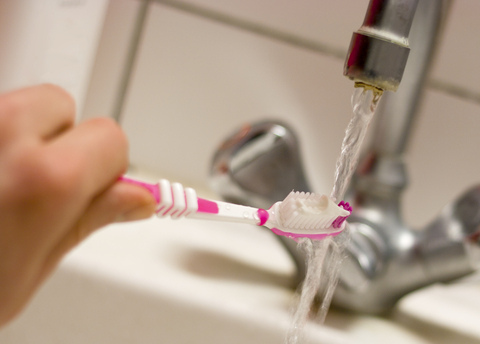Periodontics and Braces Treatment
October 8th, 2019

Most people think braces are all about their teeth. While it is true orthodontics is meant to move your teeth into proper position, there's more to it than that. To safely move your teeth with braces, you're going to need healthy and stable gums (or periodontium—the tissues that support your teeth).
For this reason it's critical to have your periodontal health evaluated prior to getting braces. This applies particularly to adults, since a 2013 study by the Center For Disease Control found that an estimated 47.2% of adults 30 years of age and older had periodontitis (gum disease). If you do have periodontitis, moving your teeth with braces will only make things worse.
Conversely, there is also risk for periodontal disease if you don't get orthodontic treatment. Malocclusion, as well as crooked and spaced teeth, can all contribute to periodontal disease. In these situations your teeth and gums are more difficult to clean and become breeding grounds for disease causing bacteria. Bad oral hygiene combined with these traits can greatly contribute to the development of periodontitis.
So, periodontics and braces have a tricky relationship. On one hand, you shouldn't get braces if you show signs of developing or have periodontitis, while on the other hand, braces can help prevent the possibility of developing periodontitis by correcting the bite and straightening the teeth.
If you are 30 years of age or older and are considering getting braces, it would be wise to first:
- Let Drs. Angela Paros, Amer Atassi, Eric Young, Alexander Katsnelson know about your desire to get braces
- Get an exam to make sure you're in good periodontal health and a good candidate for braces
- If you are a good candidate, keep an eye on your teeth and gums and get regular dental checkups throughout your entire course of treatment.
If you are in any doubt about the status of your teeth and gums, it's always best to get them checked before embarking with braces treatment. For more information or to have your periodontal health assessed for braces treatment, please contact our Romeoville, IL office.
When should a filling be replaced?
October 1st, 2019

There is no substitution for a natural healthy tooth. Dental fillings are intended to replace tooth structure and restore a tooth damaged by decay (a cavity) back to its normal function and shape. Silver (amalgam) and tooth-colored (composite) fillings last a long time, though they can develop decay when the integrity is compromised by open margins, fracture, or recurrent decay. In this blog, we discuss the signs and symptoms that indicate your filling may need to be replaced in order to prevent further complications.
Amalgam fillings are made of an alloy (mixed metals) that expands and contracts. They have no bonding properties, and so to place an amalgam filling, the hole in the tooth may need to be larger. Because of these two factors, fractures frequently occur. There are three types of cracks that are commonly associated. Craze lines are superficial with no treatment needed. Fractures extend along other parts of the tooth and may require a filling replacement or crown. Cracks extend toward the root and can require a root canal and crown or, if too severe, extraction.
A filing needs to be sealed to the tooth. If the seal between the tooth and the filling breaks down, food debris and bacteria can seep down under the filling and cause recurrent decay. If the decay is treated early, replacing the filling is adequate. If not, a crown and even a root canal may be needed. The biggest mistake you can make is waiting to do something about a broken or unsealed filling until it is painful. Doing this will only make the treatment more involved and often times more expensive.
Regular dental exams and X-rays are used to evaluate dental fillings. You will not be able to tell on your own when your fillings start to fail. Just as a car mechanic will change the oil, correct your alignment, or change your tires, a dental checkup will help you identify small concerns to fix as you go in order to avoid a critical emergency.
Pay attention to any bite or temperature sensitivity in teeth that have fillings. This can be an indicator for some of the problems listed above. You know your teeth better than anyone. Your observations are most valuable when evaluating a filling for replacement. If replacement is needed, know you are doing what is best to prevent future dental calamities and make an appointment to see Drs. Angela Paros, Amer Atassi, Eric Young, Alexander Katsnelson.
Is Coffee Damaging Your Smile?
September 24th, 2019

Coffee is one of the most popular drinks in the world. Many people have a cup, or two, or even three a day. It’s common to drink it in the morning to wake up and get ready for the day, as an afternoon pick-me-up, or just to catch up with a coworker or friend.
These days there are many different kinds of coffee flavors to enjoy, so it’s almost impossible for a person not to like it. But as delicious as coffee is, it’s worthwhile to be aware of the effects it has on our dental health.
Coffee contains a lot of tannic acid, which is what causes its dark color. Tannic acid ingrains itself into the grooves of tooth enamel, and that leads to serious stains. In addition to containing tannic acid, the fact that coffee is generally served very hot makes your teeth expand and contract, which allows the stains to penetrate even farther into the enamel.
Drs. Angela Paros, Amer Atassi, Eric Young, Alexander Katsnelson and our team know it’s not easy to kick the caffeine habit. If you find yourself needing a cup of joe every day, here are some helpful tips to consider:
- Switch to decaf coffee.
- Make it a habit to drink a glass of water with your coffee to rinse away the acid.
- Try enjoying your coffee with a straw so the tannic acid makes less contact with your front and lower teeth.
- Pop in a piece of gum after your coffee to help prevent a dry mouth.
If you’re feeling ambitious, you might find that setting a limit on the number of cups of coffee you have per week or even per day can be helpful. You are always welcome to contact our Romeoville, IL office to discuss potential whitening options as well. We’re here to help!
Germs living on my toothbrush? Say it ain’t so!
September 17th, 2019

You may have heard talk about the germs that can reside on your toothbrush and thought, “really?”
It’s true—there are several kinds of bacteria that can lurk on the bristles of your toothbrush, including streptococci, staphylococci, Herpes Simplex I, and the Influenza virus. To protect your toothbrush from bacteria, Drs. Angela Paros, Amer Atassi, Eric Young, Alexander Katsnelson and our team want you to consider the following three tips:
- Wash your hands before and after brushing.
- Allow the brush to air dry after each use, as harmful bacteria dies after being exposed to oxygen. It is best to disinfect your toothbrush weekly and allow it to dry in between use. Store the toothbrush in an upright position to allow water to drain and dry faster
- Replace your toothbrush every three to four months, or after being ill. Worn bristles are less effective in properly cleaning your teeth, and can actually be damaging to teeth if used too long!
We hope these tips help! Feel free to give us a call at our Romeoville, IL office or ask us on Facebook if you have any questions!






